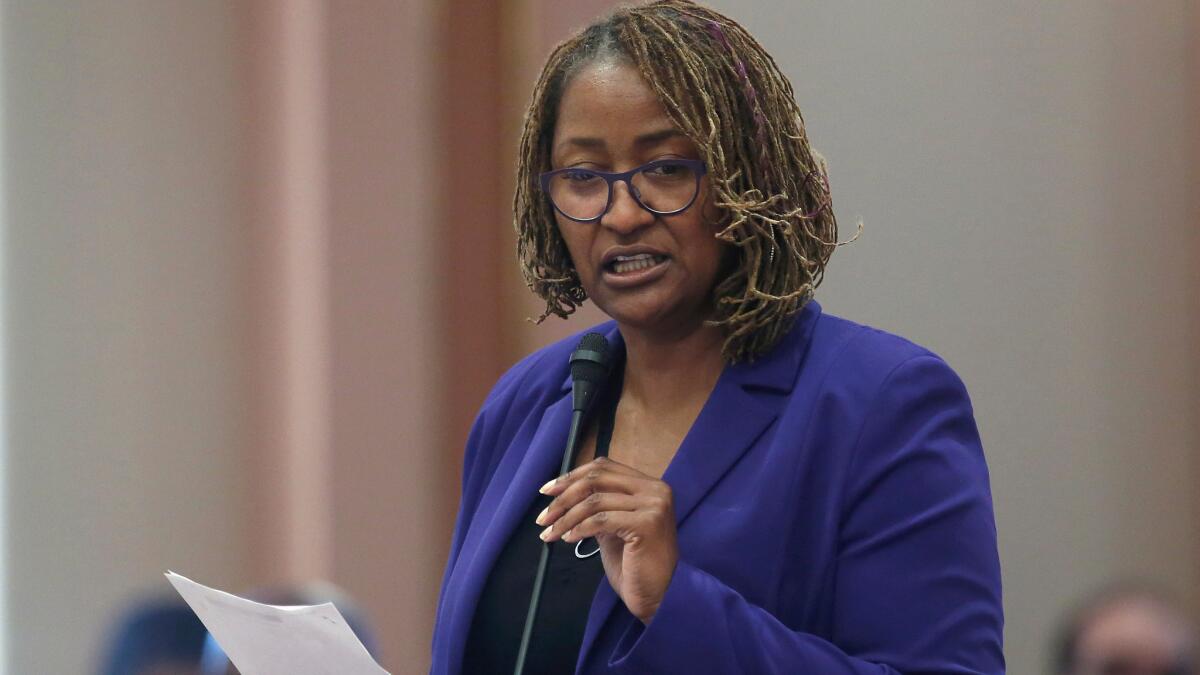New opposition leaves future of controversial housing bill SB 50 up in the air

- Share via
With less than 10 days until a key deadline, major legislation that aims to increase housing growth in California is facing new opposition.
State Sen. Holly Mitchell (D-Los Angeles) and a coalition of groups representing low-income communities are now opposed to Senate Bill 50, a bill that would allow mid-rise apartment complexes near transit stops and job centers and fourplexes in most single-family neighborhoods across the state.
Mitchell, a powerful lawmaker who is running for L.A. County supervisor and leads the Senate’s budget committee, told constituents at town halls over the weekend that she was against the bill. The groups, including the Alliance for Community Transit — Los Angeles and the Western Center on Law and Poverty, announced their position against SB 50 on Wednesday.
The bill “fails to address our most serious concerns and will exacerbate the housing challenges experienced by low-income people, people of color and other vulnerable people, the very populations being hit hardest by California’s affordability crisis,” the groups wrote in a letter to state Sen. Scott Wiener (D-San Francisco), SB 50’s author. “It fails to meet these communities’ housing affordability needs and has the potential to create new pressure and incentives for displacement.”
Separately, a group of tenant organizations from across the state sent a similar letter to Wiener on Wednesday.
The news is a blow to his efforts to advance SB 50 before the Jan. 31 deadline for it to pass the Senate. Wiener has argued that boosting growth in already developed communities is essential to addressing the state’s housing affordability challenges and to reducing greenhouse gas emissions from cars.
Mitchell had been publicly wrestling with SB 50 for more than a year. The legislation has become a hot-button issue in her race for the 2nd District seat on the Board of Supervisors amid concerns it could fuel more gentrification in South Los Angeles.
In August, she told The Times that she’d received more community feedback about SB 50 than for any other bill during the decade she’s served in the Legislature. She said Los Angeles County needed to speed housing production and that residents should accept that their neighborhoods needed to change.
“You can’t expect that we in L.A. County are going to be able to house and find housing for the 56,000 homeless people without our own neighborhoods beginning to look different,” Mitchell said then. (The number is actually closer to 59,000.)
Mitchell was unavailable for an interview Wednesday, but at a candidate forum in South Los Angeles on Saturday, she said debate surrounding the bill had become too difficult to reach consensus.
“I think fundamentally the bill number itself is too hot [of] a potato,” Mitchell said.
This is the third year in a row that Wiener has tried to advance the legislation to boost growth around transit. Following the bill’s failure in 2018, the Bay Area senator began negotiating with the coalition of groups representing low-income communities and has made a number of changes to address their worries about gentrification and displacement.
As it stands now, SB 50 would require housing projects larger than 10 units to contribute funding or space for low-income housing. Developers who hope to take advantage of SB 50 also would be prohibited from demolishing homes on properties where tenants have lived for at least seven years. It also gives low-income residents living in neighborhoods near developments built under SB 50 a preference in moving into the new units. In addition, communities at risk of gentrification would have five years to create their own blueprints for growth — compared to a two-year delay everywhere else.
Earlier this month, Wiener told The Times that he was optimistic about conversations with the coalition of groups representing low-income communities that would address the amount of low-income housing required by the bill and defining the areas that would have more time to develop alternatives to SB 50.
“I actually think we’re close,” Wiener said.
In a statement Wednesday, he said he had made progress with the coalition on promoting more affordable housing as recently as last week and noted that not all of the groups involved had signed Wednesday’s letter.
“Opposing legislation while active negotiations are progressing — and with a full nine months left in the legislative process —isn’t helpful,” Wiener said. “Fortunately, a large number of organizations that advocate for affordable housing are supporting SB 50 or continue to be neutral while negotiating in good faith with my office.”
Wiener said he planned to continue discussions with the coalition, including the groups that announced their opposition.
Both Mitchell and the groups that sent Wednesday’s letter said they would consider changing their positions if the bill was amended. But there’s not much time for that to happen prior to next week’s deadline for the bill to advance out of the Senate.
Senate President Pro Tem Toni Atkins (D-San Diego) cleared the way for negotiations to continue when she removed it last Friday from a committee led by an opponent of the bill.
“While many communities still have clear concerns about SB 50, our affordable housing crisis demands we make every attempt to reach agreement on potential solutions,” Atkins said in a statement. “I hope the additional time afforded by this action contributes to the ongoing efforts being made by Sen. Wiener, housing advocates, and community leaders.”
According to a voter-approved constitutional amendment that requires bills to be publicly available for 72 hours before they’re passed, any more changes to SB 50 would likely need to occur by Monday so senators could vote on the updated bill by their scheduled adjournment.
Gov. Gavin Newsom has not endorsed SB 50, but has encouraged continued negotiations as part of efforts to increase housing production statewide. He told reporters on Wednesday his office was helping Wiener round up votes. The governor said his staff met with the senator Tuesday night.
“I’m confident we’ll get something big done,” Newsom told reporters in San Francisco.
Times staff writer Phil Willon contributed to this report.
More to Read
Sign up for Essential California
The most important California stories and recommendations in your inbox every morning.
You may occasionally receive promotional content from the Los Angeles Times.











